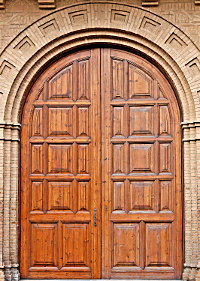
Being Catholic, by baptism or conversion, is permanent. Notwithstanding any personal renunciations to the contrary, one can not quit being Catholic any more than one can be unbaptized or quit the human race. Yet, there are many Catholics who consider themselves “ex-Catholics” or “former-Catholics.” Other Catholics might refer to them as “lapsed Catholics” or “inactive Catholics.”
Whatever label is used, it saddens me knowing that they have reached this place on their faith journey. Some have simply stopped going to church. Others have have joined other Christian communities, other religions or even adopted agnostic viewpoints.
Christ and his Church are inseparable. “Whoever listens to you listens to me. Whoever rejects you rejects me. And whoever rejects me rejects the one who sent me.” Luke 10:16 Vatican II notes:
This Sacred Council wishes to turn its attention firstly to the Catholic faithful. Basing itself upon Sacred Scripture and Tradition, it teaches that the Church, now sojourning on earth as an exile, is necessary for salvation. Christ, present to us in His Body, which is the Church, is the one Mediator and the unique way of salvation. In explicit terms He Himself affirmed the necessity of faith and baptism and thereby affirmed also the necessity of the Church, for through baptism as through a door men enter the Church. Whosoever, therefore, knowing that the Catholic Church was made necessary by Christ, would refuse to enter or to remain in it, could not be saved.
Lumen Gentium 14
When Catholics leave the Church they are leaving the one Church instituted by Jesus Himself and given authority to act in his name. They are abandoning most of the sacraments, gifts from Jesus that strengthen us and deepen our relationship with Him. They leave the fullness of the Christian faith for a subset… or worse. They often move to a world where the truths taught by Jesus are often diluted and compromised.
Why then do some Catholics leave? Simple – their faith has been poorly formed. I believe that well catechized Catholics would never leave Holy Mother Church.
Knowing the faith is not a matter of “credentials” either. Among the separated Catholics are quiet a few who can claim years of Catholic school and university attendance, while never really learning the faith with an open heart.
The reasons Catholics give for leaving often follow a few common scenarios:
- “Mass ‘doesn’t do anything for me’ and I enjoy the worship service better at XYZ.” The Mass is sacred (not entertaining) and conducted with reverence. While it includes worship, it is much, much more than that. Every Mass is a supernatural mystery where heaven and earth touch, angels and saints join us as the Last Supper and Calvary are made present. The body, blood, soul and divinity of Jesus is literally confected in the Eucharist — in which we are united with Christ and each other through all time and space. The worship services of other Christian communities, however holy and reverent, are not remotely comparable to the Mass.
- “The worship service at XYZ is so outgoing and welcoming.” Catholics are welcoming too, but Mass is solidly focused on Jesus and not a social gathering focused on how you feel. Additionally, visitors who are experienced with some Protestant churches will notice that we give them space instead of proselytizing. We have many opportunities for fellowship, but not at Mass. We welcome the opportunity to explain our faith, but do not ambush people with it. No one here will judge you as not saved.
- “I don’t accept the Catholic teaching on XYZ.” Very rarely this is theologically based, such as rejecting the Immaculate Conception or papal infallibility. Sometimes it is due to influences from the secular world such as believing that a male only priesthood is an affront to the equality of women. These would be failures of catechesis (if they are the real reason). Often the reason is that the person wants to engage in a sinful behavior (e.g. one of the many forms of sex outside of true marriage or abortion) and finds a church that is “tolerant” and “non-judgmental” to accommodate their will.
- “I am disturbed by the Catholic sex scandal.” All Catholics are, on many levels. Throughout history there have been a wide variety of scandals in the Church because we are a hospital for sinners, not a museum for saints. We are no different than every other human organization in this regard, including every other faith community. When we fail, we reform. Unlike every other organization, we are protected by the Holy Spirit to the end of time. “[U]pon this rock I will build my church, and the gates of the netherworld shall not prevail against it.” Matthew 16:18
- “I have been insulted by a {pick one: priest, religious, someone else}.” We are human and unfortunately this happens, just as it does everywhere else. I say this only to explain the problem, not excuse it. If there were only one parish and in that parish was someone who was continuously rude or insulting to you, then at least a poor case could be made for leaving Christ’s true Church.
- “I am ‘on fire’ at XYZ.” You may have (finally) learned part of the true Christian faith. (Along the way, you may have also learned some things that are not.) Another part of your experience might simply be emotional. The fullness of the Christian faith, including the truths that are exciting you now, is only in the Catholic Church. Steve Wood wrote an interesting piece for the Catholic Education Resource Center that you may want to read entitled How I led Catholics Out of the Church.
- “My boyfriend / girlfriend is at XYZ and it doesn’t really matter which church that you go to.” Our brothers and sisters in Christ include those who are in other Christian communities and we pray often for our unification. The Catholic Church however, is not just another of many Christian churches, but the one founded by Our Lord Himself. It is the only one with certain truth and the fullness of the Christian faith. It is the only one that can support and nourish you through the sacraments. Other churches share with us a portion of the Christian faith but are no substitute for the Catholic Church.
In the end, we all have free will. We can “walk with our feet” if want to, but we should know what we are walking away from. It is every Catholic’s on-going obligation to learn the teachings of the Catholic Church to the best of their ability. Doing nothing more than attending Mass once per week is insufficient.
Sadly, many who leave the Church never return. It is not unusual however, for Catholics to return home. When they do, they are often “older and wiser” with a burning zeal to really learn the faith. Here are a few of their stories:
- Kathleen Laplante
- Carmel Brizzi
- Rosemarie (then part 2 and part 3)
- Richard Evans
- Russ Rentler
- Janet Morana
- “Logeyed Roman”
- video testimonials (CatholicsComeHome.org)



























On what basis do you claim the Catholic church was commissioned by God? Evangelicals, Lutherans, Baptists, Methodists, Presbyterians, and fundamentalists all claim Peter as one of their own as well. I have always been confused by this claim of the Catholic church. Why the elitism?
Thanks Genevieve for the great question!
We believe that the Catholic Church is precisely the Church instituted by Christ, with an unbroken chain of popes beginning with Peter and authority also passed in an unbroken chain from the Apostles to our bishops of today. We call that apostolic succession and it is very, very important.
The Protestant denominations you mention are actually schisms from the Catholic Church. These were created after almost 1,500 years by men, generally not claiming to be any kind of prophets or even especially guided by the Holy Spirit. The root of the Protestant reformation was by Martin Luther, a Catholic priest. That these schisms ever happened is very sad.
Far from elitism, we view Protestants as brothers and sisters in Christ – albeit who are not in full communion with Christ's Church. Catholics pray often for full reunification.
Protestant denominations vary *extremely* widely in their beliefs from each other. Some are far closer to Catholic beliefs then they are to many other Protestant communities. They can not all be correct as the beliefs are often diametrically opposed. Their is only one truth and thus one true Church. To be in full communion with that Church would make a Christian community Catholic. To be in partial communion (as all Protestant churches are) means a community shares only a portion of the fullness of the Christian faith (from the Catholic perspective).
I hope that helps. I will follow-up with you via e-mail.
Hi George,
Thank you for including my conversion story in your entry here. I wrote it in 2007.
I am glad people are still finding it helpful.
God bless.